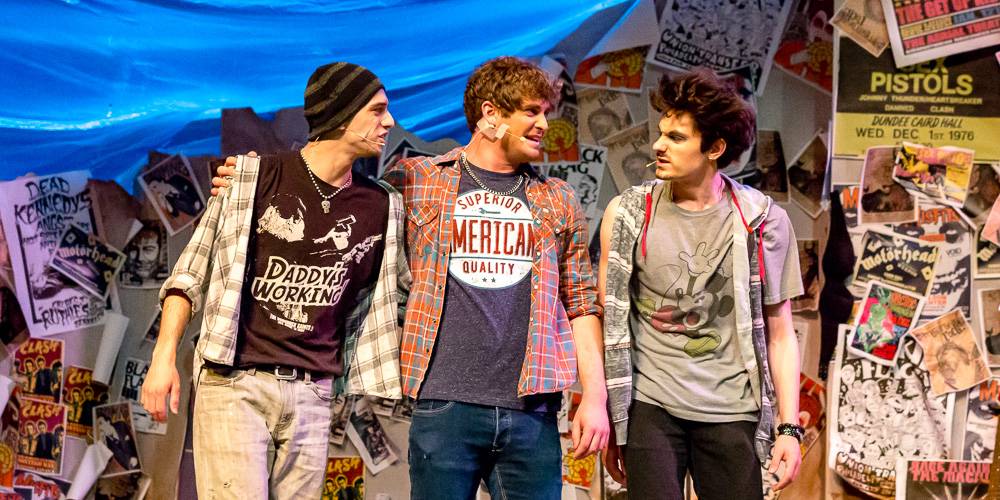When one hears the phrase “Broadway musical,” it’s probably customary to picture something a little old-fashioned. Something with a love story and a little song and dance. A kick line of beaming businessmen, perhaps, or plaintive lovers serenading each other under a well-hung moon. Maybe someone with an umbrella. Musicals like this are comforting and nostalgic to audiences, and for this reason they are endlessly popular.
But there is another breed of musical out there – rougher around the edges, crackling with a contemporary energy – that comes off less comforting than it does confrontational. Less song and dance; more rock and roll.
In the last couple of Broadway decades, RENT would fall into this category, as would the raucous (if short-lived) Bloody Bloody Andrew Jackson — the former standing out as an incredibly of-the-moment burst of anguished angst; the latter a fusion of historical subject and modern music that predated Hamilton. I mention these shows in particular because they exist in a sort of pop-rock subcategory of musical theatre that expands boundaries and often draws new eyes and ears to the form. Another thing they have in common — locally speaking — is director Mikel L. Matthews Jr., who has staged them both.
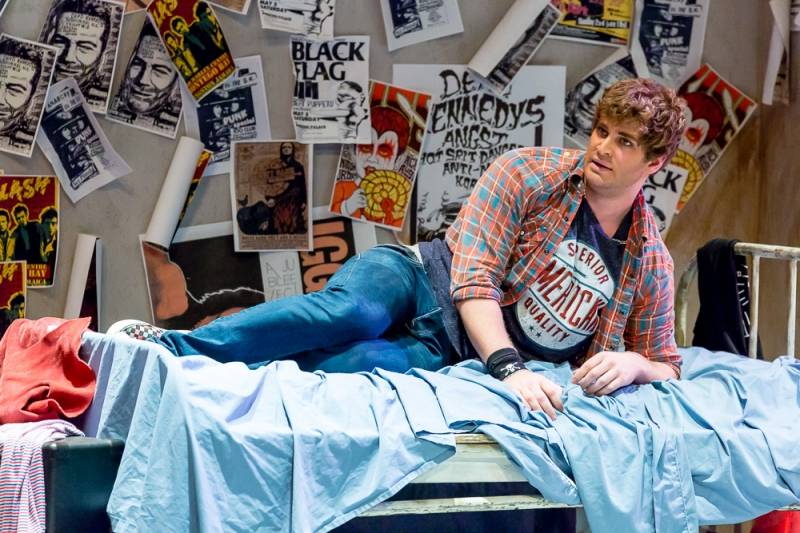
Matthews has directed other types of shows over the years, of course, in venues like the venerable Station Theatre. And although I’m sure he’d prefer not to be pigeonholed in any way, it must be acknowledged that he has carved out a bit of a niche for himself when it comes to shows featuring “the music the kids like.” It’s no wonder that the recently-formed Twin City Theatre Company (also known as TCTC or Twin City Squared) would reach out to Matthews to direct the best current example of a rock musical, Green Day’s American Idiot.
For the uninitiated, American Idiot (released 2004) began as a concept album for Green Day, chronicling disaffected angst in a post-9/11 America. Director Michael Mayer then expressed interest in adapting the album for the stage, adding only a smattering of interstitial dialogue to the songs and letting the songs themselves propel the action. The stage production began its Off-Broadway life at Berkeley Repertory Theatre in 2009, breaking records for the venue, then transferred to the St. James Theatre for a Broadway run that lasted almost exactly a year. The Broadway run of American Idiot ended April 24, 2011, after 422 performances.
Cut to the present and the expansive auditorium of the Harold and Jean Miner Theater at Parkland College, where TCTC opened American Idiot this past Friday under the direction of Matthews, assisted by (among others) Musical Director Griffin Jenkins, Choreographer Whitney Havice, Scenic Designer Nicholas Schwartz, and Costumer Thom Schnarre.
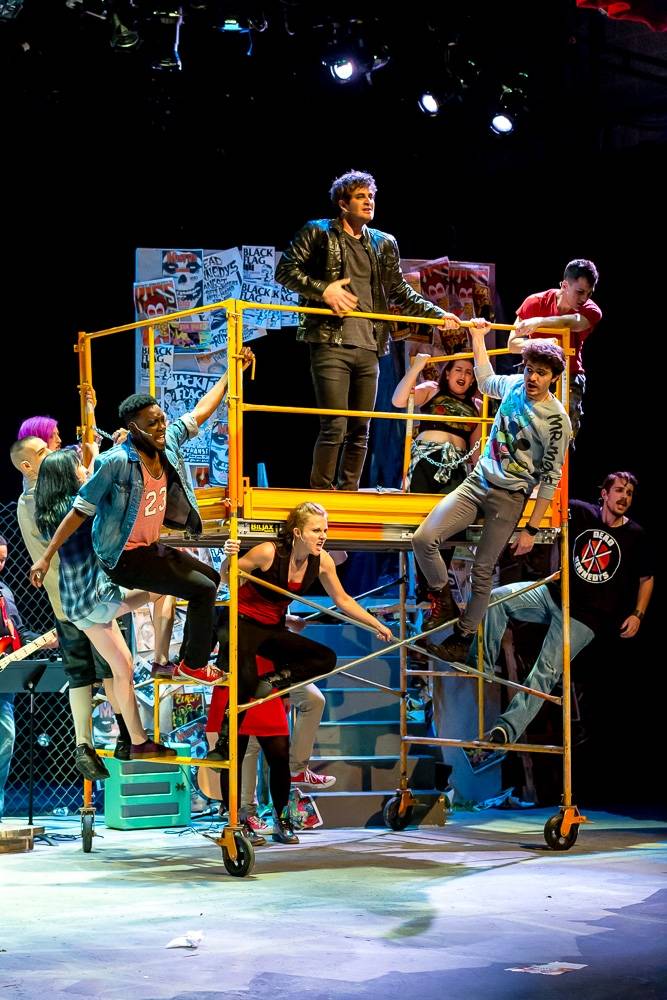
Summarizing the plot of this pop-punk project is tricky, not because I worry about spoilers but rather because the plot isn’t a selling point. Not that there isn’t a narrative — there is. Each of the main characters has a bit of an arc, but these chronological bits of information are glimpsed only in passing as the songs take the spotlight. Think of it like you would a music video (remember those?): the story is implied, and you’ll get the gist, but we’re not reading Dostoyevsky here.
The aforementioned main characters are Johnny (Jesse Trieger, above atop scaffolding) and his best friends Tunny (Jace Jamison) and Will (Isiah Asplund). Initially, these three musician friends intend to set off for New York together, but Will is forced to stay behind when his girlfriend reveals that she is pregnant. Johnny and Tunny forge ahead but are soon parted by outside influences: Johnny is seduced by drugs while Tunny is seduced by a pro-military fervor that leads him to enlist. Things go badly for everyone, then they get better, then they get a lot worse, then they get a little better.
Trieger is supremely engaging as Johnny, bringing humor and heart to a character who is essentially kind of an asshole. (Well, to be fair, he starts off as an asshole. Then he becomes a junkie. Then he cleans up and is a little less of an asshole.) In a cast that is bursting with energy of every kind, Trieger’s kinetic presence and strong voice stand out above the rest. I was particularly taken with his ballads (especially “When It’s Time”) which provide oases of reflection amid the tumult of the rest of the score.
 As Tunny, Jace Jamison (pictured, right) manages to make an impression despite having very little dialogue and far fewer solos. In fact, due to mic issues that plagued the opening night performance, he was very hard to hear during songs. At times, this made his character’s journey amount to little more than pantomime. Despite this unfortunate technical disadvantage, Jamison is memorable. He has proven to be a versatile and dependable character actor over the last couple of years, and I hope to see more of him.
As Tunny, Jace Jamison (pictured, right) manages to make an impression despite having very little dialogue and far fewer solos. In fact, due to mic issues that plagued the opening night performance, he was very hard to hear during songs. At times, this made his character’s journey amount to little more than pantomime. Despite this unfortunate technical disadvantage, Jamison is memorable. He has proven to be a versatile and dependable character actor over the last couple of years, and I hope to see more of him.
Asplund’s Will falls into the category of “Characters So Underwritten They Are Barely There,” but he manages to convey the disappointment of the young man stuck in a small town. It’s a disappointment in his circumstances, certainly, but also a disappointment in himself. That comes through quite clearly in Asplund’s expressive, fidgety body language. He, too, sings well despite the albatross of a patchy body mic.
[Note: The body mic issue was a major one. It detracted from the actors’ efforts constantly and badly diminished the experience. It’s unfortunate, especially in a show that asks so much of a cast’s voices, and I hope the issue is resolved in subsequent performances. It is, I think you’ll agree, always better to applaud because “That knocked me back in my seat” rather than “They’re trying their best.” That said, I will not comment on actors’ vocal quality for the remainder of this review because it’s not fair for me to undercut any praise I might offer while beating a dead horse to death on its deathbed.]
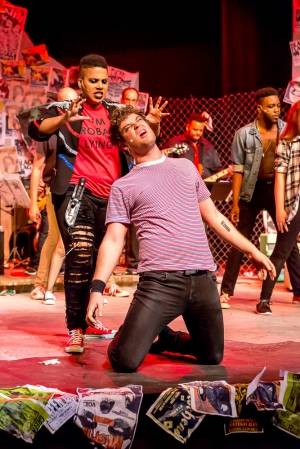 As for the rest of the cast, the standout show-off role is that of St. Jimmy, the drug pusher who torments and delights Johnny, ruining his relationship (and nearly his life) in the process. This is a brass ring of a role—one that Billie Joe Armstrong played himself for a time while the show was on Broadway—and Laura Alcantara (left, with Trieger) snatches it with abandon. Alcantara has tremendous stage presence and makes the most of every moment she’s on stage.
As for the rest of the cast, the standout show-off role is that of St. Jimmy, the drug pusher who torments and delights Johnny, ruining his relationship (and nearly his life) in the process. This is a brass ring of a role—one that Billie Joe Armstrong played himself for a time while the show was on Broadway—and Laura Alcantara (left, with Trieger) snatches it with abandon. Alcantara has tremendous stage presence and makes the most of every moment she’s on stage.
Also impressive is Kimmy Schofield (pictured below) as Whatsername, the young woman with whom Johnny falls in love while beginning his foray into addiction. I recently saw Schofield in the Station Theatre’s production of She Kills Monsters (also directed by Matthews), and she was a crowd favorite there as she is here. She conveys a lot of strength on stage and has natural presence. I look forward to seeing her in other roles, hopefully even some that don’t require her to be dressed as a fetish object. My sense of Ms. Schofield, thus far, is that she deserves equally large roles in material that will showcase her talent and not just her muscle definition.
And no, that’s not a misprint: the main female character in this production is called “Whatsername.” Of the other two female characters who are named, one is “Heather;” the other is “Extraordinary Girl.” So yes, there is an element of bro swagger to the proceedings. Make of that what you will, but consider the source – by which I mean the culture of punk rock rather than the actors and producers of this show. I’m not claiming to know all about punk rock here. I’m not claiming to know all about anything. I just thought the faint odor of misogyny was worth acknowledging. On the subject of the source, however, I should point out that nobody presented here is winning at life. The restlessness, aimlessness, and fundamental loneliness surrounding punk culture absolutely permeates this show, from Johnny and Tunny on through to the smallest ensemble role.
That spirit – a forced air of superiority over anyone who doesn’t “get” their pain, a “fuck you” mentality towards any and all who might cause them harm – is both frustrating and a bit thrilling to watch. It’s pretty sad at its core, but there’s a bravery in the resolution to punch out at that sadness. The most telling lyrics in all of the show’s hard-charging setlist, are the following:
I don’t care if you don’t
I don’t care if you don’t
I don’t care if you don’t care
 On the one hand, this first one speaks to the camaraderie of desolation, which is a bit of an explanation as to why young people who seem to hate everything so much seem to like each other so much. On the other hand, it’s letting the world know right where they stand (see the aforementioned “fuck you”).
On the one hand, this first one speaks to the camaraderie of desolation, which is a bit of an explanation as to why young people who seem to hate everything so much seem to like each other so much. On the other hand, it’s letting the world know right where they stand (see the aforementioned “fuck you”).
The other lyric that’s been stuck in my head ever since the show ended last Friday night is this:
Nobody loves you
Everyone left you
They’re all out without you
Having fun
If the show has a common thread, it’s this. It’s not just Will’s theme, sitting on a couch in Hometown, USA. It’s not just Johnny’s, as he wastes away in a derelict room in New York, or Tunny’s, as he goes looking for purpose in an Army uniform. This is the secret rallying cry of the lot of them (and possibly a lot of us, on some days): that it’s hard to act like you don’t care when you really wish someone cared about you.
The rest of the cast and ensemble do solid work as a variety of punks, junkies, cubicle dwellers, and wounded soldiers, making their quick changes and depicting background drama as the music drives the show along. This parade of movement comes across fairly smoothly, although elements of the choreography get a little stiff as the show goes on. Not necessarily the choreographer’s fault, as you can only do so much with head-banging, fist-pumping, and mean-mugging. There is definitely energy on display here, and only occasionally does it look a bit shaggy. Ms. Havice has served the material and the show well, and she is blessed in this show to have a number of credible dancers.
The costumes are appropriately unappealing, but that’s the point. The danger (and possibly the reprieve) of dressing a bunch of punks is that they can’t look too good. That said, the leads have distinctive looks, and the outfits worn by the ensemble make clear delineations between background characters throughout. A case in point is Jon Faw, who makes a pretty stunning shift from punk misfit to patriotic poster boy (and whose “Favorite Son” moment is a lot of fun).
The set is a busy yet simple affair that looks like a scaled-down version of the Broadway set, only with an emphasis on punk music rather than politics. Whereas the set in the St. James relied heavily on TV screens of news footage and a wallpapering of newspaper headlines, the TCTC set by Mr. Schwartz utilizes a colorful array of gig posters featuring (among others) Green Day and The Misfits. On a smaller stage and with a smaller budget than the New York or touring productions, the set on the Miner stage nonetheless evokes chaos and disorder very effectively.
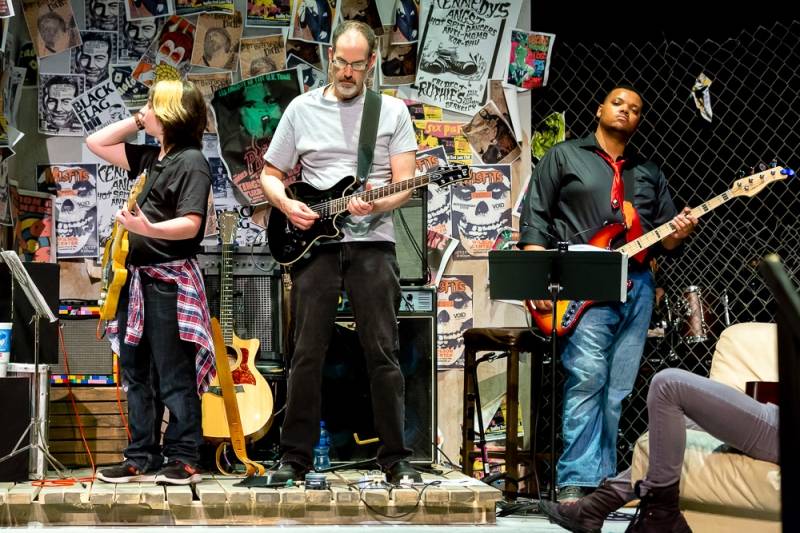
And godDAMN can we get a hand for the BAND? A show like this, in which the music is so very crucial (and so widely well-known), absolutely demands that the band be up to the task. Thankfully for the cast, the producers, and anyone in the audience like me (who played the American Idiot CD on a constant loop when it was new), the orchestra is tight and right. Sound issues aside (see above), I could not have been happier with the sounds being flung defiantly off that stage. In addition to the unseen violin (Johnny Lusardi), viola (Rebecca Saul), cello (David Goldenbaum), and keyboard (Musical Director Griffin Jenkins), I must give special recognition to the on stage “house band.” These four individuals—David Butler and Eli Knoke on guitar, Efrem Tutwiler on bass, and Ian Shaw on drums—are the driving force behind this production, and respect must be paid. Butler is a regular accompanist for local musicals, and his work here is top-notch; likewise Mr. Knoke, who is officially the most badass junior high student I’ve ever observed.
So…Great music, great cast. Great show? Yes and no. Mostly yes. It’s a lot of fun, and I do think it deserved better than the exuberant but smallish number that attended the opening night performance. Not that a crowd of 60 or 70 is bad, but in a house the size of Parkland’s main stage, it did give the impression of a half-filled club gig. It makes we wonder what the energy of a capacity crowd would do for the actors on stage. (Kudos, by the way, to the punk rock spirit displayed by all the people who showed up late. Way to keep it real, folks.)
Taken altogether, it is not a perfect show. Microphone troubles aside, there are wildly uneven transitions and a couple of mobile set pieces that add little to the overall effect. However, these are minor quibbles, and the imperfect whole is made of some very enjoyable pieces. Will it be everyone’s cup of tea? Certainly not. The language may put off the Fiddler on the Roof set, but I hold out hope that this show will attract one first-time theatre attendee for every “traditional” patron who avoids it.
Green Day’s American Idiot is brash, it is overwrought, and it is ultimately a little shallow. But, with all due respect, so is a lot of punk rock music. That doesn’t mean that it won’t entertain you. That doesn’t mean it won’t move you.
That doesn’t mean it won’t rock.
********
Performances of American Idiot, produced by Twin City Theatre Company, continue in Parkland College’s Harold and Jean Miner Theater June 2, 3, 4, and 5. For times and tickets, visit the Twin City Squared website.
All photos by Scott Wells.








